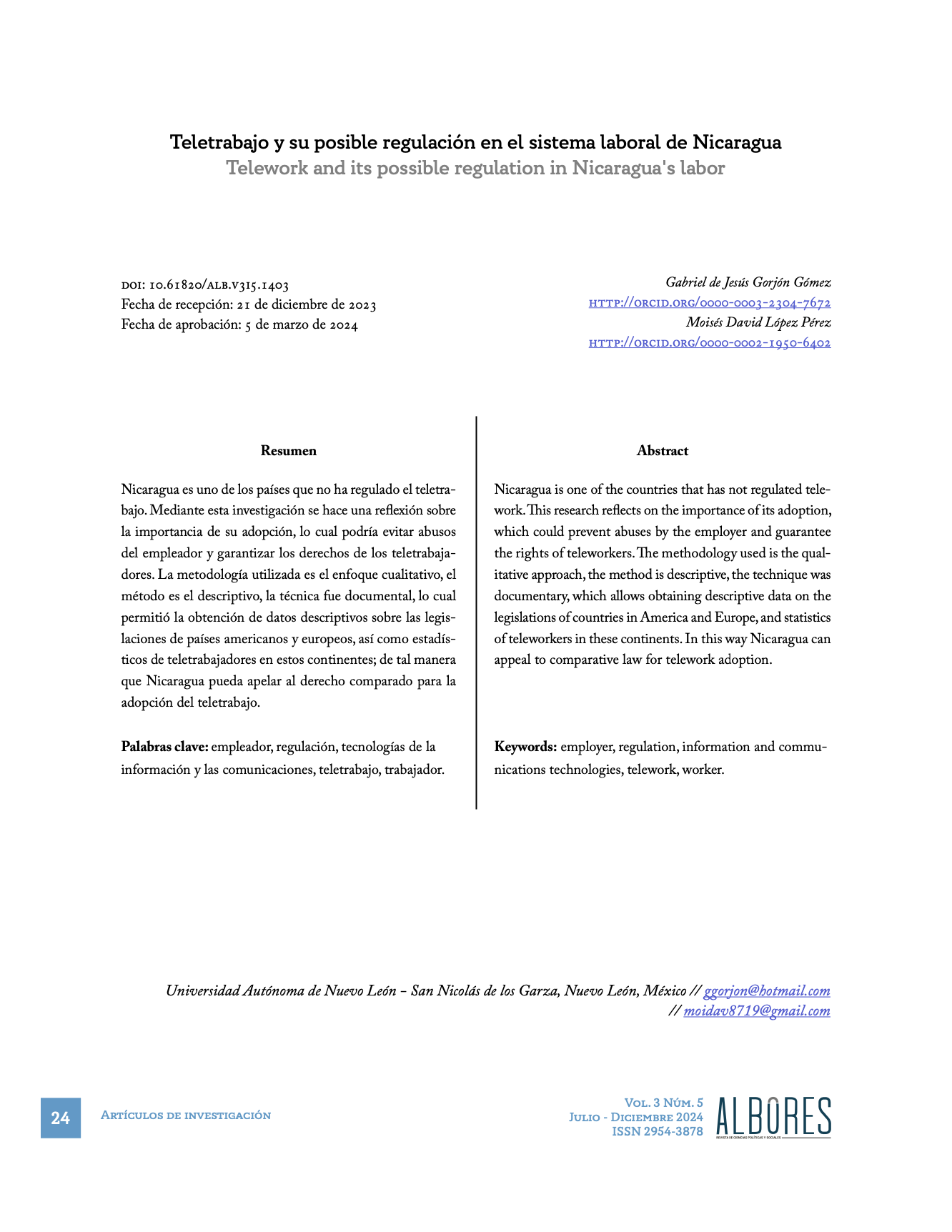Abstract
Nicaragua is one of the countries the Latin America that has not promoted a bill to regulate telework. Regulating telework would prevent abuses by employers and guarantee the rights of these workers. It is considered relevant to demonstrate the importance of regulating this modality in Nicaragua, for this research is carried out with a qualitative approach, supported by the descriptive method and using the documentary technique. This article is valuable among other reasons because it presents elements that should be considered by the state of Nicaragua for the adoption of telework in its labor system.
References
Amat, O. (2020). Economía del Teletrabajo, impacto en las personas, la empresa y la sociedad. En X. A. Llavina, et al., Teletrabajo: vivir y trabajar mejor (Primera Edición ed.). Profit Editorial I., S., L.
Asamblea Nacional. (1996). Código del Trabajo, ley No. 185. Managua, Nicaragua. Recuperado el 29 de junio de 2023 de https://www.poderjudicial.gob.ni/cjnejapa/image/codigo-trabajo.pdf
Castillo, J. A. (2016). El teletrabajo y la importancia de su adopción en los sistemas jurídicos laborales de los países centroamericano. Cuaderno jurídico y político, 2(6). Recuperado el 31 de enero de 2024 de https://repositorio.unp.edu.ni/233/1/476-1895-2-PB.pdf
Castillo, J. A. (2016). El teletrabajo y su importancia de adopción en los sistemas juridicos laborales de los paises centroamericanos. Cuaderno jurídico y político, 2(6). Recuperado el 12 de diciembre de 2023 de https://www.camjol.info/index.php/cuadernojurypol/article/view/10969/12846
CEPAL. (2021). Estudio Económico de América Latina y el Caribe. Recuperado el 21 de enero de 2024 de https://repositorio.cepal.org/server/api/core/bitstreams/dae0d47c-e8bc-4bf6-b6a4-fd9ab98ba8d6/content
CES-Confederación Europea de Sindicatos. (16 de julio de 2002). Acuerdo Marco Europeo sobre Teletrabajo. Recuperado el 04 de diciembre de 2022 de https://www.ccoo-servicios.es/archivos/altamira/20110727_acuerdo_marco_europeo_teletrabajo.pdf
Eurofound y OIT. (2019). Recuperado el 15 de diciembre de 2023 de https://www.ilo.org/wcmsp5/groups/public/---americas/---ro-lima/---sro-santiago/documents/publication/wcms_723962.pdfeurostat. (17 de 05 de 2021).
eurostat. Recuperado el 04 de febrero de 2024 de https://ec.europa.eu/eurostat/databrowser/view/LFSA_EHOMP__custom_899843/bookmark/table?lang=en&bookmarkId=1a955ba3-e7ff-42b5-9449-69a6db8750ff
Gaitán, M. C. y Acevedo, Y. M. (2023). Regulación jurídica del teletrabajo en Nicaragua, Costa Rica y Panamá (Análisis Comparativo). Revista Humanismo y cambio social, 10(21). doi:10.5377/hcs.v21i21.16766
García, M. E. (2020). Las TIC como elemento de gestión de la relación laboral. En A. G. Sánchez, TELETRABAJO elementos técnicos, jurídicos y gestión de conflictos. Tirant lo Blanch.
Gómez, C. A. (2020). Senado de la República. Recuperado el 05 de febrero de 2024 de http://bibliodigitalibd.senado.gob.mx/bitstream/handle/123456789/5018/CI_70.pdf?sequence=1&isAllowed=y
ITA LAC. (2017). Academia Internacional de Transformación del Trabajo. Recuperado el 21 de enero de 2024 de https://www.ita-lac.org/wp-content/uploads/2019/ITALAC-INFORME-ESTADO-DEL-TELETRABAJO-EN-LATINO-AMER%C3%8DCA-2017.pdf
Lemus, R. P., Gómez, R. V. y Chávez, G. O. (2023). Derecho del Trabajo, panorama actual u nuevas realidades. Cosegraf.
Lister, K. y Tom, H. (29 de 11 de 2019). Elgaronline. Recuperado el 05 de febrero de 2024 de https://www.elgaronline.com/edcollchap-oa/edcoll/9781789903744/9781789903744.00009.xml
Maurizio, R. (julio de 2021). Organización Internacional del Trabajo. Recuperado el 20 de enero de 2024 de https://www.ilo.org/wcmsp5/groups/public/---americas/---ro-lima/documents/publication/wcms_811301.pdf
OIT. (20 de junio de 1996). C177-Convenio sobre el trabajo a domicilio, 1996 (núm.177). Ginebra, Suiza. Recuperado el 12 de diciembre de 2022 de https://www.ilo.org/dyn/normlex/es/f?p=NORMLEXPUB:12100:0::NO::P12100_INSTRUMENT_ID:312322
OIT. (28 de marzo de 2017). Organización Internacional del Trabajo. Recuperado el 25 de febrero de 2023 de https://www.ilo.org/wcmsp5/groups/public/---europe/---ro-geneva/---ilo-madrid/documents/publication/wcms_615487.pdf
OIT. (2021). Nuevo informe de OIT - Panorama laboral 2021 de América Latina y el Caribe. Recuperado el 02 de febrero de 2024 de https://www.oitcinterfor.org/nuevo-informe-oit-panorama-laboral-2021-am%C3%A9rica-latina-caribe
OIT. (17 de junio de 2021). Organización Internacional del Trabajo. Recuperado el 20 de enero de 2024 de https://www.ilo.org/wcmsp5/groups/public/---ed_norm/---relconf/documents/meetingdocument/wcms_806097.pdf
OIT. (2023). Organización Internacional del Trabajo. Recuperado el 21 de enero de 2023 de https://www.ilo.org/wcmsp5/groups/public/---americas/---ro-lima/documents/publication/wcms_906617.pdf
Osejo, L. (2018). Relaciones laborales atípicas en Nicaragua. SENICSA.
Palomares, M. B. (2020). Recomendaciones y normativa internacional en materia de teletrabajo. En A. e. Sánchez García, TELETRABAJO Elementos técnicos, jurídicos y gestión de conflictos. Ciudad de México, XII: tirant lo blanch. Recuperado el 04 de diciembre de 2022 de https://www.tirantonline.com.mx/tolmex/bibliotecaVirtual/ebookInfo?isbn=9788413554310
Quezada, N. L. (2010). Métodología de la Investigación. Macro E.I.R.L.
San Juan, C. (2021). Estudio comparado de la legislación sobre teletrabajo en los países de América Latina y el Caribe. Recuperado el 08 de diciembre de 2022 de https://fundacionelectra.org.uy/wp-content/uploads/2021/07/Estudio_comparado_legislacion_Teletrabajo_ALC_2021.pdf
Todolí, A. S. y Pozuelo, A. M. (2020). El Teletrabajo. Valencia. Recuperado el 04 de diciembre de 2023 de https://www.tirantonline.com.mx/tolmex/bibliotecaVirtual/ebookInfo?isbn=9788413781297
Toledo, P. (02 de julio de 2021). Análisis comparativo de las leyes sobre el teletrabajo en el cono sur. JOURNAL OF MANAGEMENT & BUSINESS STUDIED. Recuperado el 07 de febrero de 2024 de https://revistas.uautonoma.cl/index.php/jmabs/article/view/1578
Tomasina, F. y Pisani, A. (15 de 04 de 2022). Pros y contras del teletrabajo en la salud física y mental de la población general trabajadora: una revisión narrativa exploratoria. Archivos de prevensión de riesgos laborales, 25(2), 14. Recuperado el 05 de febrero de 2024 de https://archivosdeprevencion.eu/index.php/aprl/article/view/199/124
Varela, A. (2020). Teletrabajo. Guía Práctica. RA-MA Editorial.
Vásquez, R. L. (2021). Manual en esquemas de metodología para investigaciones mixtas en ciencias sociales. Tirant lo Blanch

This work is licensed under a Creative Commons Attribution-NonCommercial-ShareAlike 4.0 International License.
Copyright (c) 2024 Albores


